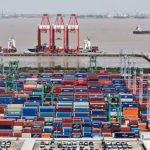
Malaysia boosts China palm oil exports as EU calls for ban of products from deforested land
KUALA LUMPUR – Malaysia will increase palm oil exports to China by 500,000 tonnes a year as it faces pressure from new European Union restrictions targeting deforestation, a senior minister told AFP on Monday.
The trading bloc introduced new rules this year that ban goods from land that has been deforested.
It is a move aimed at throwing its muscle into the fight against climate change and environmental destruction.
Palm oil is blamed by environmentalists for fuelling the destruction of rainforests in Malaysia and Indonesia, which together produce 85 per cent of global output.
But the EU rules have been highly controversial in producer countries, with both Malaysia and Indonesia protesting the move.
Malaysia’s Plantation and Commodities Minister Fadillah Yusof told AFP that his country is now raising exports to China, a major importer of the commodity.
“China’s import of palm oil and palm-based products from Malaysia was 3.14 million tonnes in 2022,” he said.
That will grow by the end of 2023 or early 2024 with “additional uptakes of 500,000 tonnes of palm oil” by Beijing, he said.
The increase is the result of a deal between Malaysian-headquarted palm oil product firm Sime Darby Oils International and Chinese state-owned Guangxi Beibu Gulf International Port Group.
It will “definitely” help Malaysia counter European curbs, he added.
“Chinese importers are buying high value-added downstream palm products produced from Malaysia,” he said.
The edible oil is used in foods such as cakes, chocolate and margarine, as well as cosmetics, soap and shampoo.
Malaysian palm oil exports to China are now expected to hit 3.2 million tonnes for 2023, Mr Yusof said.
But the country has “no intention” of turning away from the European Union, currently the second largest importer of Malaysian palm oil after India, and just ahead of China.
Mr Yusof slammed the regulations as a “trade barrier which curtails free and non-discriminatory market access”.
But he added Kuala Lumpur still hopes the bloc’s stand will “evolve over time”.
Malaysian and Indonesian officials are actively lobbying Brussels over the rules, which do not come into full effect for 18 months, to give producers time to work out compliance.
Representatives from the two countries are due to meet EU officials in Kuala Lumpur for new discussions in December, Mr Yusof confirmed. AFP






![Pakistan accuses the TTP of carrying out attacks on its territory and the Afghan Taliban government of harbouring the group [File: Fayaz Aziz/Reuters]](https://asiandiplomacy.com/wp-content/uploads/2025/10/2023-02-27T041341Z_1777986366_RC2O7Z9GI1FB_RTRMADP_3_PAKISTAN-BLAST-POLICE-1760256429-150x150.webp)